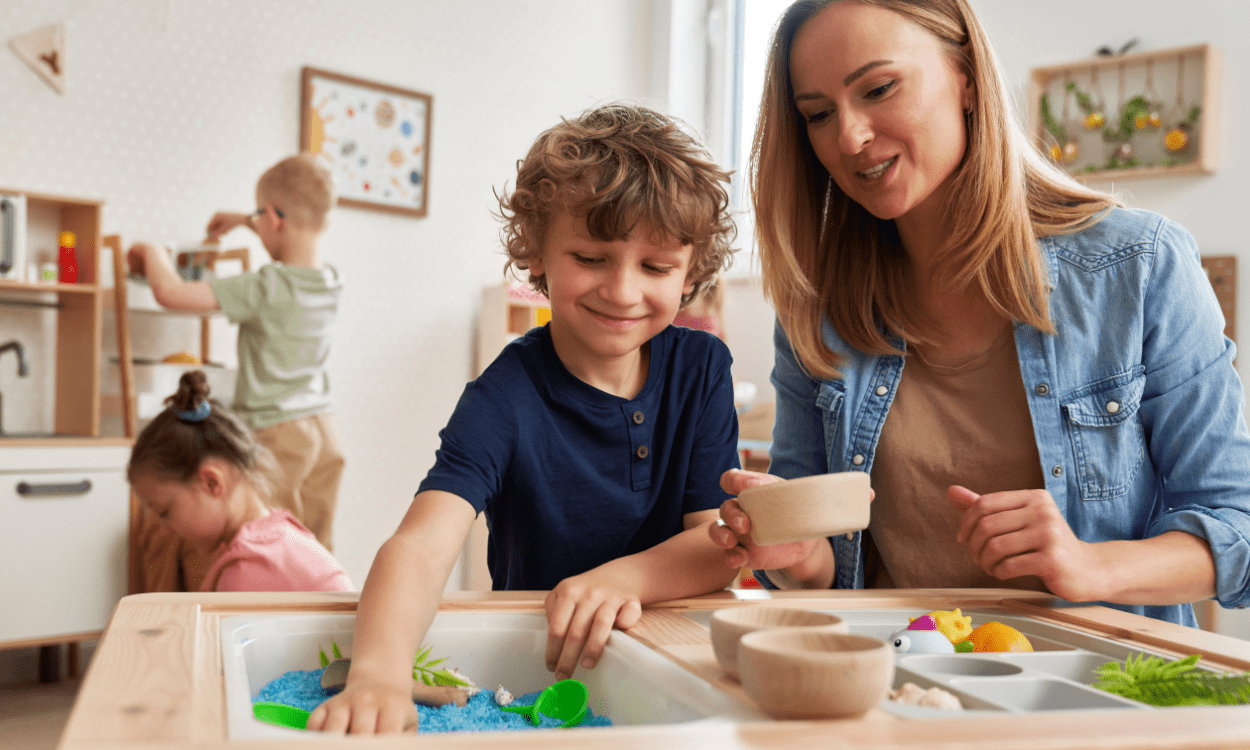Montessori doesn’t have to stop when the school day ends! With a few simple changes at home, you can reinforce what your child is learning and help them thrive even more.
Here’s how you can bring Montessori habits into your home in practical, meaningful ways.
Create an Organized and Accessible Environment
One of the key principles of Montessori is having a space where everything has its place. At home, this means setting up shelves or baskets where toys, art supplies, or materials are neatly organized and easy for your child to reach. This helps your child choose their activities independently and encourages them to return items when they’re done. It’s amazing how much pride they take in taking care of their space when it’s set up just right for them!
Rotate Toys and Simplify Your Space
Instead of overwhelming your child with a room full of toys, choose a few and rotate them regularly. This keeps their interest fresh and encourages deeper engagement with what’s available. You’ll likely notice that they spend more time focused on each activity when they aren’t surrounded by too many choices.
A calm, clutter-free environment also supports focus and order. This doesn’t mean turning your home into a museum — just reduce excess and keep the child’s area tidy and purposeful. A simplified space gives your child the opportunity to think clearly and engage more deeply with their surroundings.
Encourage Independence in Daily Life
Montessori classrooms empower children to do things on their own — and you can do the same at home. Let your child help with preparing snacks, setting the table, cleaning up, or picking out clothes. Provide child-sized tools, like small pitchers, step stools, or brooms, so they can participate confidently and safely. Yes, it might take longer, and yes, there will be messes — but the skills and confidence they gain are worth it.
Focus on Hands-On, Purposeful Activities
Look for activities that engage your child’s senses and involve real-life tasks. This can include gardening, baking, sorting laundry, or doing puzzles. Practical life activities — those that have a real purpose — build fine motor skills, problem-solving abilities, and concentration. They also help children feel like valued members of the family.
Be a Model of Respect and Patience
In Montessori, respect is foundational. At home, this means speaking calmly, listening to your child’s ideas, and treating them as capable individuals. It also means slowing down and allowing them time to complete tasks on their own. When you model patience and respect, your child learns to do the same with others.
Support Concentration and Focus
Children naturally focus best when they aren’t being rushed or interrupted. Give them the space to work through activities at their own pace. If they’re immersed in building, drawing, or pouring water from one cup to another — resist the urge to jump in. Let them experience the satisfaction of completing something on their own.
Instead of rushing to fix every problem, let your child experience the natural outcomes of their actions when it’s safe to do so. For example, if they spill water, give them a towel and show them how to clean it up. These everyday moments are powerful teaching opportunities that build responsibility and resilience.
Bring Montessori Home — and Connect with Us!
Bringing Montessori habits into your home helps reinforce what your child is learning at Inspire Kids Montessori — and it strengthens their independence, confidence, and love of learning.
If you’d like to learn more about our educational philosophy or see how we bring Montessori to life in the classroom, reach out to us today to schedule a tour of our facilities. We’d love to show you how we help children flourish both in school and at home.

